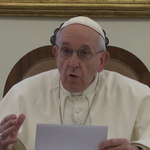

An estimated 1,500 government officials and representatives of non-governmental organizations from more than 140 countries gathered in Brussels, Belgium on February 26, 2019 for the opening of the Seventh World Congress Against the Death Penalty. The World Congress – organized by the Ensemble Contre la Peine de Mort and the World Coalition Against the Death Penalty – is the world’s leading convocation on capital punishment. The four-day meeting formally opened on February 27 with a ceremony in the European Parliament in Brussels featuring remarks by European Union Foreign Policy Chief Federica Mogherini, Belgian Foreign Affairs Minister Didier Reynders, and video messages from United Nations Secretary-General António Guterres and Pope Francis encouraging the delegates to strive for global abolition of the death penalty.
The opening of the Congress followed a high-level death-penalty panel discussion by the United Nations Human Rights Council in Geneva, Switzerland on February 26 focusing on human rights abuses in the application of capital punishment. Michelle Bachelet, the UN High Commissioner for Human Rights, introduced the panel by reiterating the international body’s long-held beliefs on capital punishment. “The UN opposes the use of the death penalty, everywhere, and in all circumstances,” Bachelet said. “Today, I am pleased to say, there is a clear international trend towards abolition.” The topic of human rights, discrimination, and the death penalty, she said “is particularly well chosen, because nowhere is discrimination more evident than when one looks at the people on death row – the people who society has decided are beyond rehabilitation and should be killed. … [D]eath rows are disproportionately populated by the poor and economically vulnerable; members of ethnic minorities; people with psycho-social or intellectual disabilities; foreign nationals; indigenous persons; and other marginalised members of society.” Speaking on behalf of the eight countries that sponsored the resolution calling for the panel debate, Minister Reynders expressed special concern about the use of the death penalty as punishment for peaceful expression of religious or political beliefs, blasphemy, same-sex relationships, and consensual sexual relations outside of marriage. “The application of the death penalty in these cases,” he said, “takes on a particularly discriminatory nature.”
In his video message to the Congress, Secretary-General Guterres said “[t]he death penalty has no place in the 21st century.” He called the record number of nations that sponsored last December’s UN General Assembly resolution for a global moratorium on the use of the death penalty evidence of progress, but said it was still “far from enough.” The death penalty, he said “is still employed despite its cruelty, despite the myth that it deters crime and despite the knowledge that innocent people have been – and may continue to be — put to death.” The video message by Pope Francis (pictured) encouraged activism against the death penalty as a “courageous affirmation of the principle of the dignity of the human person.” The Pope called capital punishment a “serious violation of the right to life. … While it is true that human societies and communities have to often face very serious crimes that threaten the common good and the safety of people, it is not less true that today there are other means to atone for the damage caused,” Francis said. The Pope stressed that “the dignity of the person is not lost even if he has committed the worst of the crimes. … It’s in our hands to recognize the dignity of each person and to work so that more lives are not eliminated.”
The Seventh World Congress also provided a special forum for European leaders to focus on the use of the death penalty in Belarus, the sole remaining country on the continent to authorize capital punishment. The 47-nation Council of Europe and the World Congress have jointly organized a round table meeting on the Belarusian death penalty on February 28, with the participation of Anaïs Marin, the UN Special Rapporteur on human rights in Belarus and representatives of the Belarusian government.
(EU Parliament to host conference on abolishing the death penalty, Modern Diplomacy, February 23, 2019; Christopher Vincent, Belgium continues to argue for universal abolition of the death penalty, Brussels Times, February 26, 2019; Inés San Martín, Pope says Church’s teaching on death penalty has ‘matured’, Crux, February 27, 2019; Human Rights Council holds high-level panel on the death penalty, in particular with respect to the rights to non-discrimination and equality, United Nations Human Rights Council, February 26, 2019; Death penalty: Filling Europe’s black hole, Council of Europe, February 26, 2019.) Read the video message of UN Secretary-General António Guterres to the 7th World Congress and watch the video statement by Pope Francis. Read the opening statement of UN High Commissioner for Human Rights Michelle Bachelet at the Geneva human rights forum. See International.


